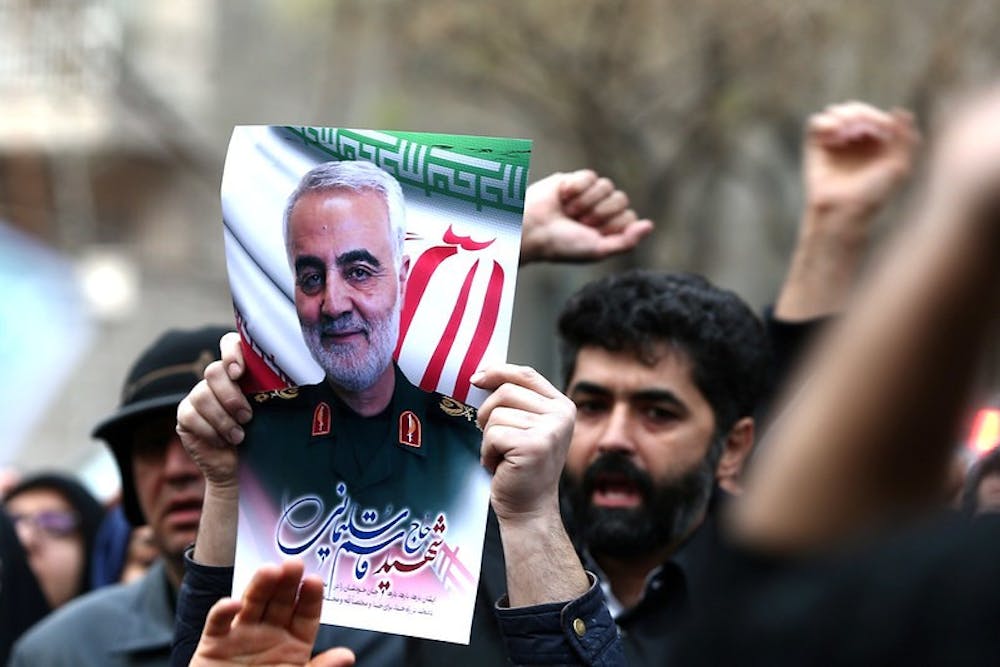On Jan. 3, President Trump directed the U.S. military to carry out a drone strike in Iraq, killing one of Iran’s most famous and powerful generals, Qasem Soleimani. Trump justified the successful strike claiming that the Iranian was “plotting imminent and sinister attacks on American diplomats and military personnel.” This claim could be true but Sen. Rand Paul was right in stating that it spelled the “death of diplomacy” between the US and Iran while raising questions about the power of the executive branch.
Soleimani might have been a “bad guy” but Trump’s decision to assassinate him is an act of war against Iran. The Iranian was most likely on a diplomatic mission in Iraq. Imagine if the roles were reversed. How would the US react if Secretary of State Mike Pompeo was killed by an Iranian drone strike while visiting Iraqi officials? It would not matter what justification Iran would give - that Pompeo was planning imminent attacks against Iranians - the US would treat that as an act of war.
A Fox News headline from last week read, “Did the media forget Qassem Soleimani was a terrorist?” Political Commentator Piers Morgan defended Trump’s decision, making the false equivalency that those in opposition must have also opposed the killings of Osama bin Laden and former ISIS leader al-Baghdadi.
These arguments all miss the mark. Iran and its government cannot be compared to non-state groups such as Al-Qaeda and ISIS. Soleimani was a top Iranian general and while he might have been just as bad as bin Laden or Al-Baghdadi, he was a state actor, not a rogue terror group leader. Many on the left have criticized Trump’s strike as not just an act of war but as a needlessly aggressive move, arguing that it further deteriorates the relationship between the two nations and uniting Iranians behind their religious hardliners.

At the same time, the justification for the strike has become increasingly questionable. Trump first stated that attacks on Americans were “imminent,” suggesting that immediate action was required. Pompeo then later stated in a recent Fox News interview that “there is no doubt that there were a series of imminent attacks that were being plotted by Qasem Soleimani. We don’t know precisely when and we don’t know precisely where but it was real.” The threat posed by Soleimani went from “immediate” to “at some point.” The assassination of a general that posed no threat to the U.S. is an act of war.
The U.S. should engage diplomatically with Iran to avoid a direct conflict, but that is now highly unlikely. More importantly, questions must be raised as to whether Trump had the authority to order such a strike without Congress. The U.S. Constitution stipulates that only Congress can declare war, but U.S. presidents have consistently violated this by launching military strikes without such approval. President Obama ordered at least 500 drone strikes during his eight years in office, killing many innocent civilians. Strikes in Iraq and Afghanistan were technically legal as Congress authorized military force in those nations, but many took place in Somalia, Yemen and Pakistan where Congress never approved military action.
The ever increasing power of the U.S. executive to order military strikes without any Congressional oversight is truly scary. Since the beginning of his term, Trump has taken advantage of these powers increasing drone strikes by 432%. Critically, his decision to assassinate Soleimani was done so without any input from Congress at all, let alone its approval.
In 2017, Trump bombed a Syrian airbase in response to the nation’s president Bashar Al-Assad allegedly using chemical weapons against anti-government forces. This action, another clear act of war against the Syrian state, was not approved by Congress either. These instances happen quite often. Any Democratic opposition to this executive power, however, would be laughable as the party establishment were all for it under Obama.
The assassination of Soleimani was not only an act of war and shockingly shortsighted but it raises deeper questions about the power of the US executive branch. Unfortunately, as long as both parties fully support this executive authority when someone from their side sits in the White House, nothing will change in the foreseeable future.









